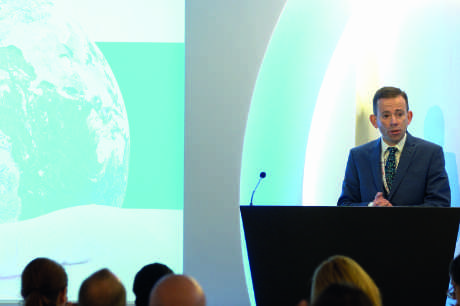
If the Government doesn’t invest more funding urgently, a sustainable, quality childcare sector is at risk, according to a leading property expert.
Speaking at the Nursery World Business Summit earlier this month, Courteney Donaldson, managing director of childcare and education at Christie & Co, said, ‘Childcare is now back on the political agenda, but it will soon fall off again.
‘There is a massive shortfall in funding, and that is impacting on sustainability. It is not doing what it needs to: to grow the sector and recruit, retain and pay staff to the level that is required.
‘My concern is if things stay the way they are, if investment is not made now, we are not going to have stable high-quality early years provision for all our children and families in 20 years’ time.’
Ms Donaldson was speaking after the launch of a workforce trends report comparing the childcare workforce in 12 different countries, produced by Christie & Co – Early Education & Care: Workforce trends & associated factors.
While addressing the funding shortfall was key, she said, business rates relief was also needed. ‘If the Government isn’t going to invest the funds that are required then, God forbid, I started thinking about Liz Truss [the former childcare minister who proposed changing child:adult ratios in 2013]. If they are not going to provide the funds, then what are the options?’
RATIOS
Ms Donaldson said the report was sparked partly by concerns that ratios may be revisited in the UK. Ratios currently being used by survey respondents varied from a maximum of 1:13 three- to four-year-olds in Japan to 1:6 for this age group in Norway, and 1:7 in the UK, Australia and Canada, with varying qualification levels expected for practitioners in each.
According to the report, ‘If there was a change in ratios, this could possibly compromise the quality of childcare given.’ It warns, ‘Unscrupulous providers could use a ratio reduction for their commercial gain…putting profits first which could very negatively impact on quality. The consequence of this could [be] two-tiered provision…particularly for disadvantaged children.’

Michael Hodges, (pictured above), managing director of healthcare at Christie & Co, added that often-overlooked ‘practical issues’ with nursery buildings would pose problems for any reduction in ratios.
He said, ‘Nurseries are often converted buildings, some are on different floors, you might not have a clear line of sight.’ According to Christie & Co data, at least 77 per cent of nurseries sold each year are in converted, rather than purpose-built, settings.
TO PAY OR NOT?
While funding in the UK amounts to £6bn per year until 2020, OECD data, cited in the report, shows that the UK fares third-worst out of 12 sampled countries in terms of overall government spending on early years education). Despite the ‘free’ entitlements, average Government spending in the UK is £2,828 per child per year, equal with Japan (which has a maximum of 55 funded hours over 38 weeks, according to the report) and more than only the US (£1,911). In Norway, Sweden, Canada, Iceland and Denmark, average spending is more than £7,000 per child per year.
Fees are more likely to be higher in countries with less subsidy because more of the cost of delivery then falls to parents. Christie & Co’s survey data shows average daily fees in the UK are £53, compared with £13 in Norway, where parents’ fees are limited to 6 per cent of household income per year.
In Japan, which has subsidy caps depending on the type of pre-school, parents spend £37 per child per day on average, similar to Canada (£38). In the US, however, this average is £65 – the highest in the sample.
Providers at the summit had mixed views on how much parents should be asked to pay.
Andy Morris, chairman of Little Garden Day Nurseries in London and former chief executive of 96-strong chain Asquith Day Nurseries, said, ‘At some point we have to be honest and say parents have to pay for quality. It is a poor excuse when we say parents can’t afford this because they are going to have to.
‘I put my fees up because I offered better quality. At the end of the day, parents who work understand value. I don’t think the industry explains value enough to parents. We have talented people that are teaching the future of this country’.
However, Diana Lawton, managing director of Our Monkey Club in Derbyshire, said, ‘I have a graduate-led workforce, and a great apprenticeship programme, but I can’t pay my staff any more money. I have parents that are using food banks, I have to get Tesco to give me food, so I can give it to the parents. I do coat and shoe swaps for the children.
‘I understand parents should be able to pay and I understand I have to be able to provide quality. But if I did top-up fees, 50 per cent of my parents wouldn’t be able to afford it. How do I do it when I have so many parents who are in poverty?’
Ms Donaldson said this was a ‘massive challenge’ for providers, but the forthcoming general election had put childcare funding on the agenda again, and pointed to the Liberal Democrats’ promise to increase funding – by 37 per cent for two-year-olds to £7.22 per hour, and by 20 per cent for three- and four-year-olds to £5.35 per hour.
‘As we go into the next funding round [we] have to be united. We have to increase lobbying to ensure that fair funding is received for all,’ she said.
CHILDCARE GAP
The report notes there is a gap between the end of parental leave and the beginning of funded hours in most countries, and the UK’s ‘childcare gap’ is among the largest, despite the 30-hours offer for three- and four-year-olds and funding for two-year-olds for disadvantaged families.
‘In countries such as the Nordics, there is a smaller “childcare gap” mainly because children are legally entitled to a childcare place from an earlier age [nine months in Finland and one year in Norway and Sweden] and governments are responsible for ensuring demand is met,’ the report says.
The UK also fares badly for paid parental leave relative to the other countries in the sample, with only six weeks of fully paid parental leave versus 32 in Denmark, 30 in Sweden, 18 in Australia and 15 in France.
TECHNOLOGY
An ‘acute’ early years workforce shortage in Japan has led to a robot called Vevo taking children’s temperature (an everyday procedure in the country) and giving their parents a verbal report explaining what the child has done that day.
Introduced by Tokyo-based childcare operator Global Bridge Holdings, children swipe wristbands against the ‘robot practitioner’, which then registers their attendance; the machine also updates its tablet with information such as what the child has eaten throughout the day.
The report also reveals that Dubai is likewise embracing robots with facial-recognition software, which can call up information about children or staff, in order to act as personal assistants for teachers.
Overall, while there are growing populations in most of the countries sampled, birth rates are falling. However, in the UK, female employment rates have risen significantly.
Ms Donaldson said that coupled with Government investment, and the fact it was a ‘needs-driven sector’, childcare is still seen as attractive by investors. Investor confidence is ‘really high’ because parents are reliant on the private sector to provide childcare.
MORE INFORMATION

The Big Debate, ‘UK nursery businesses: striving for success’, in association with Christie & Co, took place at Nursery World’s sixth annual Business Summit on 13 November (www.nurserybusiness-summit.com). For more information about Big Debates and other events, email tom.curtiss@markallengroup.com
This article is published in association with Christie & Co.









